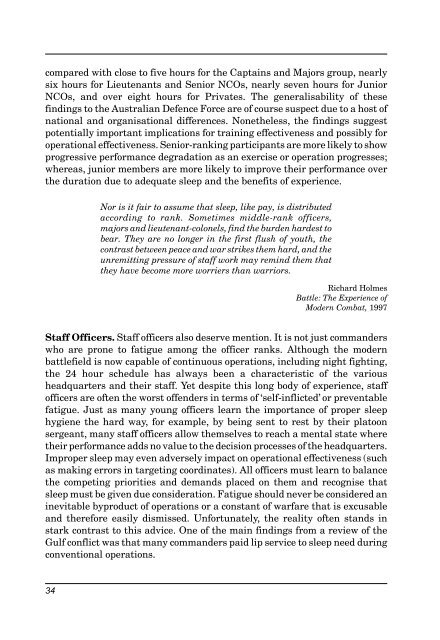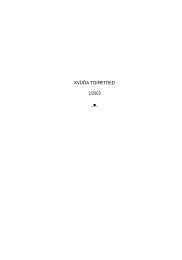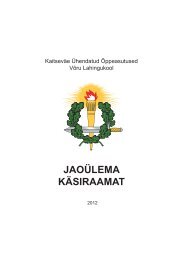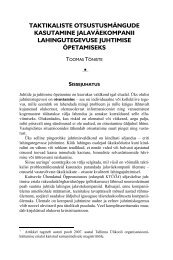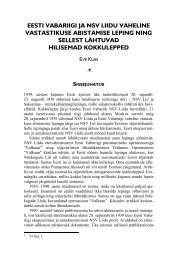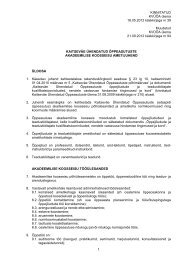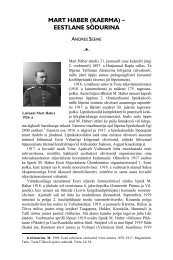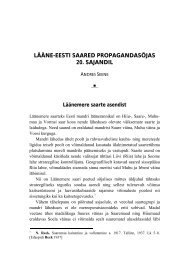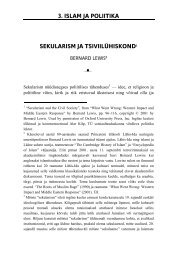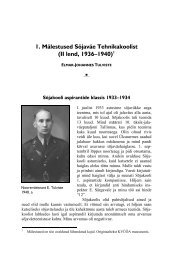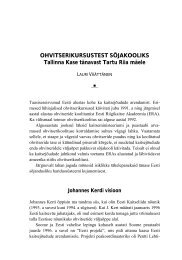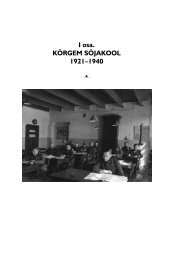Fatigue Management
Fatigue Management
Fatigue Management
You also want an ePaper? Increase the reach of your titles
YUMPU automatically turns print PDFs into web optimized ePapers that Google loves.
compared with close to five hours for the Captains and Majors group, nearly<br />
six hours for Lieutenants and Senior NCOs, nearly seven hours for Junior<br />
NCOs, and over eight hours for Privates. The generalisability of these<br />
findings to the Australian Defence Force are of course suspect due to a host of<br />
national and organisational differences. Nonetheless, the findings suggest<br />
potentially important implications for training effectiveness and possibly for<br />
operational effectiveness. Senior-ranking participants are more likely to show<br />
progressive performance degradation as an exercise or operation progresses;<br />
whereas, junior members are more likely to improve their performance over<br />
the duration due to adequate sleep and the benefits of experience.<br />
Nor is it fair to assume that sleep, like pay, is distributed<br />
according to rank. Sometimes middle-rank officers,<br />
majors and lieutenant-colonels, find the burden hardest to<br />
bear. They are no longer in the first flush of youth, the<br />
contrast between peace and war strikes them hard, and the<br />
unremitting pressure of staff work may remind them that<br />
they have become more worriers than warriors.<br />
Richard Holmes<br />
Battle: The Experience of<br />
Modern Combat, 1997<br />
Staff Officers. Staff officers also deserve mention. It is not just commanders<br />
who are prone to fatigue among the officer ranks. Although the modern<br />
battlefield is now capable of continuous operations, including night fighting,<br />
the 24 hour schedule has always been a characteristic of the various<br />
headquarters and their staff. Yet despite this long body of experience, staff<br />
officers are often the worst offenders in terms of ‘self-inflicted' or preventable<br />
fatigue. Just as many young officers learn the importance of proper sleep<br />
hygiene the hard way, for example, by being sent to rest by their platoon<br />
sergeant, many staff officers allow themselves to reach a mental state where<br />
their performance adds no value to the decision processes of the headquarters.<br />
Improper sleep may even adversely impact on operational effectiveness (such<br />
as making errors in targeting coordinates). All officers must learn to balance<br />
the competing priorities and demands placed on them and recognise that<br />
sleep must be given due consideration. <strong>Fatigue</strong> should never be considered an<br />
inevitable byproduct of operations or a constant of warfare that is excusable<br />
and therefore easily dismissed. Unfortunately, the reality often stands in<br />
stark contrast to this advice. One of the main findings from a review of the<br />
Gulf conflict was that many commanders paid lip service to sleep need during<br />
conventional operations.<br />
34


